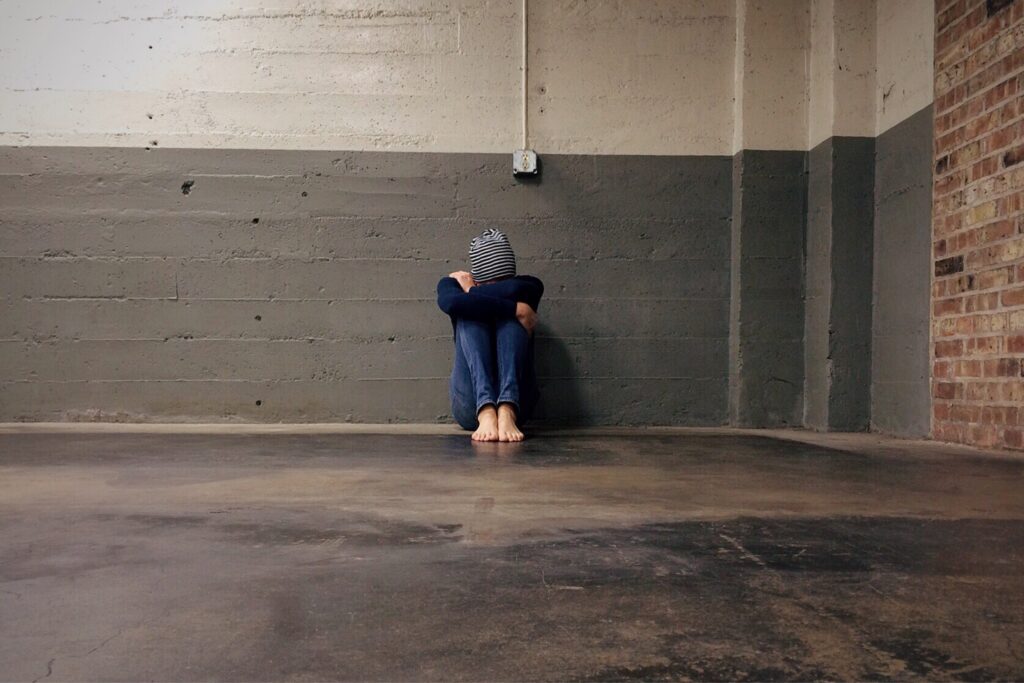Signs You’re Severely Depressed, Not Just Sad

This is a disclaimer that this article is for informative purposes only. It is not intended to diagnose or treat any condition. Please reach out to a qualified healthcare provider or mental health professional if you are struggling.
It is natural to feel sad sometimes. It is a normal reaction to situations that make you upset. Some days that sadness can be bearable, some days you need some help dealing with it. But sometimes, it can keep going on and on for days, weeks, or even months, with no end in sight. It can impact your everyday life and change it for the worse. When that happens, it’s no longer just sadness, but depression.
Depression is not one single disorder with a specific set of symptoms, but instead you can think of it as a continuum of signs, going from mild (which is the closest to sadness, although it’s still different!) to more severe. Mental health professionals identify different “types” of clinical depression, based on this severity, and they diagnose their patients accordingly. This is not meant to discredit anyone’s sadness – just because your depression is “mild” and not severe, it doesn’t mean your problem is less important. It just helps the professionals figure out what is the best approach to help you.
If you’re unsure if your sadness is something more than just sadness, or if you’re afraid you might be depressed, look out for some of these signs:
1. Sleeping too much

Do you feel like you just can’t get enough sleep? Either you wake up in the morning and go back to bed almost right after, or you sleep until the late afternoon…
Sleeping too much during the day, even after you’ve had a full night’s sleep, is called hypersomnia, and it is one of the most common symptoms of mood disorders, including depression.
When you feel sad you might also feel like you don’t want to do anything else but sleep. Maybe you wake up a little later than usual and wish you were still asleep, but most of the time you manage to get out of bed somehow.
But if you’re severely depressed, it can feel like your brain simply refuses to be awake. You may also feel like sleep is an escape from the depressive reality you live in. And even if you wanted to get up and do stuff – you just can’t, it’s like you’re being chained to your bed.
Not only is this symptom difficult to deal with on its own, together with the fact you’re probably suffering from severe depression, but it can also lead to some other health problems, some of which include: troubles with memory, headaches and migraines, weight gain and heart disease.
2. Social withdrawal

Sadness can sometimes isolate you from your friends and family. You might feel like it’s hard to hang out when you’re feeling blue, and you’d rather stay in your room and listen to your favourite sad playlist until that feeling goes away.
But if you’re severely depressed, spending time with others can feel like a chore you keep putting off. No matter how much you love your friends, family, partner… you just don’t want anyone’s company. Being around people can feel suffocating in a way, because you feel like you’re forced to smile, laugh, talk, engage… it feels as if you have to act like nothing’s wrong, because how could they understand?
You feel the need to push people away, to make everyone leave you alone, even though deep inside all you want to do is someone to be by your side.
Social withdrawal is a trap depression makes you fall into – you isolate yourself because it’s what you think you need, but it actually makes you feel more lonely and depressed.
3. Poor personal hygiene

Have you ever felt too tired to wash your hair, so you decided to just spray some dry shampoo for the day? For people with severe depression, every day feels like skipping a shower.
If you’re struggling with this symptom, you probably feel embarrassed to even think about it, let alone talk about it. But this is something that happens to many people with depression – a Global School-based Student Health Survey showed that girls and boys who reported symptoms of depression had an increased likelihood of poor hand and oral hygiene, including washing their hands rarely or never, and brushing their teeth less than daily.
This is one of the obvious signs of a severe depressive disorder, since it’s visible on the body, not just in the mind.
It can be extremely hard to brush your teeth, comb your hair, take a shower or wash your clothes. This can happen because you just don’t have the energy to do it, because you’re not even leaving your home, or you may feel like there’s just no point.
4. Losing interest in hobbies and activities

Sadness can make you feel unmotivated to do things you usually like. Maybe you decide you don’t really want to go to see that movie or you skip your sports practice.
When you’re severely depressed, that feeling goes even further. You almost completely lose interest in your hobbies and the activities you used to enjoy. It just doesn’t bring you any happiness anymore. This can reinforce the lack of motivation you feel, and it can worsen your symptoms in several ways. It can isolate you from others or make you feel like you’re not yourself anymore. Also, since you don’t do much during the day, you feel bored all the time, and boredom leaves you with too much time for bad thoughts that run through your head constantly.
This happens to you because of the way depression impacts your brain – messing up important hormones and brain structures that usually help you stay active and motivated.
5. Suicidal thoughts

When you’re feeling sad, you may fantasise about going away for some time, away from the situation that makes you sad and away from the worries that trouble you. But if you daydream of being gone for good, and think about taking your own life, that almost certainly rings the alarm and shows you could be suffering from severe depression.
We can’t emphasize enough how serious this symptom is. According to the 2017 National Survey by the Substance Abuse and Mental Health Services Administration, 4.3% of U.S. adults ages 18 and older had thoughts about suicide, and the risk of suicidal ideation (sucidial thoughts) gets higher for people with mental disorders. And this is what makes depression a potentially deadly disease.
It is heartbreaking to see anyone feel so much pain that they wish dying is the only solution. But the thing with depression is: it CAN be treated. Medicine and psychology came a long way to develop treatment options (hospitalization, medicine, a combination of psychotherapy and pharmacotherapy, support groups and many others). And as other depressive symptoms get under control, suicidal thoughts would get under control, too. It’s important to give treatment a chance.
IMPORTANT!
If you or someone you know has suicidal thoughts, get help right away through one or more of these resources:
- Reach out to a close friend or a loved one.
- Call a suicide hotline number.
In the United States, call the National Suicide Prevention Lifeline at 1-800-273-8255 to reach a trained counselor.
For Canada, call: 1-833-456-4566.
For Australia, call: 131114.
For the United Kingdom, call: 0800689 5652
Click here to see suicide hotlines and emergency lines for other countries.
- Make an appointment with your doctor or a mental health professional.
Closing thoughts
Do you see yourself in some of these signs?
If you do, please know that there will always be someone to help, and that recovery is possible, no matter how hard or unbelievable it may seem. Your doctor or a mental health professional is here to hear you out, examine the symptoms you’re struggling with, and offer you treatment.
Asking for help is the bravest and the best thing that you can do for yourself, so don’t go through this alone!
Thank you for reading!
Written by: Stela Košić
References:
- Ayas, N. T., White, D. P., Manson, J. E., Stampfer, M. J., Speizer, F. E., Malhotra, A., & Hu, F. B. (2003). A Prospective Study of Sleep Duration and Coronary Heart Disease in Women. Archives of Internal Medicine, 163(2), 205. https://doi.org/10.1001/archinte.163.2.205
- Chaput, J. P., Després, J. P., Bouchard, C., & Tremblay, A. (2008). The Association Between Sleep Duration and Weight Gain in Adults: A 6-Year Prospective Study from the Quebec Family Study. Sleep, 31(4), 517–523. https://doi.org/10.1093/sleep/31.4.517
- Cooper, J. A., Arulpragasam, A. R., & Treadway, M. T. (2018). Anhedonia in depression: biological mechanisms and computational models. Current Opinion in Behavioral Sciences, 22, 128–135. https://doi.org/10.1016/j.cobeha.2018.01.024
- Dauvilliers, Y., Lopez, R., Ohayon, M., & Bayard, S. (2013). Hypersomnia and depressive symptoms: methodological and clinical aspects. BMC Medicine, 11(1). https://doi.org/10.1186/1741-7015-11-78
- Depression Traps: Social Withdrawal, Rumination, and More. (2010, December 6). WebMD. https://www.webmd.com/depression/features/depression-traps-and-pitfalls
- Ferguson, S. (2019, October 28). Yes, Mental Illness Can Impact Your Hygiene. Here’s What You Can Do About It. Healthline. https://www.healthline.com/health/mental-health/mental-illness-can-impact-hygiene
- Murru, A., Guiso, G., Barbuti, M., Anmella, G., Verdolini, N., Samalin, L., Azorin, J., Angst, J. J., Bowden, C., Mosolov, S., Young, A., Popovic, D., Valdes, M., Perugi, G., Vieta, E., & Pacchiarotti, I. (2019). The implications of hypersomnia in the context of major depression: Results from a large, international, observational study. European Neuropsychopharmacology, 29(4), 471–481. https://doi.org/10.1016/j.euroneuro.2019.02.011
- Nock, M., Borges, G., Bromet, E., Alonso, J., Angermeyer, M., Beautrais, A., . . . Williams, D. (2008). Cross-national prevalence and risk factors for suicidal ideation, plans and attempts. British Journal of Psychiatry, 192(2), 98-105. doi:10.1192/bjp.bp.107.040113
- Osmun, R. (2021, October 11). Oversleeping: The Effects & Health Risks of Sleeping Too Much. Amerisleep. https://amerisleep.com/blog/oversleeping-the-health-effects/
- Purse, M. (2020, March 25). What Is Suicidal Ideation? Verywell Mind. https://www.verywellmind.com/suicidal-ideation-380609
- Ranasinghe, S., Ramesh, S., & Jacobsen, K. H. (2016). Hygiene and mental health among middle school students in India and 11 other countries. Journal of Infection and Public Health, 9(4), 429–435. https://doi.org/10.1016/j.jiph.2015.11.007
- Substance Abuse and Mental Health Services Administration. 2017 National Survey on Drug Use and Health (NSDUH) Releases. 2017.
- The “Cycle of Social Withdrawal” People With Mental Illness Might Relate To. (2021, December 16). The Mighty. https://themighty.com/2020/06/the-depression-project-cycle-of-social-withdrawal/
- Torelli, P., Cologno, D., & Manzoni, G. C. (1999). Weekend Headache: A Retrospective Study in Migraine Without Aura and Episodic Tension-Type Headache. Headache: The Journal of Head and Face Pain, 39(1), 11–20. https://doi.org/10.1046/j.1526-4610.1999.3901011.x
- Whelan, C. (2017, March 31). Is It Depression or Sadness? Learn the Signs. Healthline. https://www.healthline.com/health/depression/depression-vs-sadness#symptoms
- Xu, L., Jiang, C. Q., Lam, T. H., Liu, B., Jin, Y. L., Zhu, T., Zhang, W. S., Cheng, K. K., & Thomas, G. N. (2011). Short or Long Sleep Duration Is Associated with Memory Impairment in Older Chinese: the Guangzhou Biobank Cohort Study. Sleep, 34(5), 575–580. https://doi.org/10.1093/sleep/34.5.575




Responses